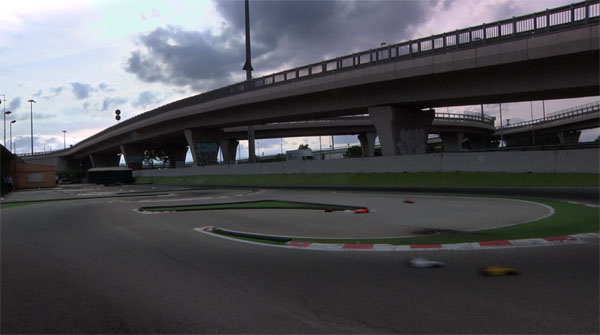“Italian documentarian Gianfranco Rosi has been at Venice on several occasions,” writes John Bleasdale at CineVue—and Rosi’s just won the Golden Lion for Sacro GRA. Bleasdale: “Rosi’s roam on the orbital road of the title is a fascinating, witty and meditative piece which delivers an alternative view of Rome, far from the postcard locales of the Coliseum and La Dolce Vita. The road runs round the film, like a roaring river, filled with stories whilst passing unknowingly a landscape also rich in life and narrative. There are the herds of sheep and a tree surgeon who hopes to save his palms from an invasion of a rapacious insects.”
“The ring road around Rome, the Grande Raccordo Anulare is the most extensive urban highway in Italy,” explains Jay Weissberg in Variety. “Punning on the ‘Sacro Graal,’ or ‘Holy Grail,’ this follow-up to Rosi’s American-set Below Sea Level takes a neutral look at intriguingly disparate lives near the highway’s edge, yet neglects to demonstrate why they should all be in one film. Diversity alone isn’t enough to warrant inclusion, and without deeper delving into personalities or a more cogent construction, the idea remains more absorbing than the final product.”
But the Hollywood Reporter‘s Deborah Young quite likes Rosi’s decision not to try “to make a big point or push a political agenda… Rosi (no relation to veteran director Francesco Rosi) was inspired by author Italo Calvino’s Invisible Cities, in which Marco Polo is imagined describing his travels to emperor Kublai Khan…. Among the interesting eccentrics he films are two aging transvestites who live in a camper parked on the side of the road, a prince and his family who rent their richly appointed home out to film crews and as a bed & breakfast, an eel fisherman who lives on the river with his middle-aged Ukrainian wife, and so on…. There’s nothing that could be called hilarious or earth-shaking here, yet these slightly off-beat folk hold viewers’ attention with their everyday stories, which are excellently cut by Rosi’s regular editor Jacopo Quadri before they become tedious.”
Camillo de Marco for Cineuropa: “In Boatman, Rosi made a film about a boatman on the Ganges river, with Below Sea Level, he moved to the American desert to film a deserted military base and a community of homeless people, in El Sicario, Room 164, he zeroed into a former drug trafficker and murderer from the Mexican cartels.” Sacro GRA‘s “conception started with urban landscape artist Nicolò Bassetti, who put forth an idea to the director to map the multiple identities within this place through its stories and people.”
Suggesting that Sacro GRA could be “the counter melody” to Paolo Sorrentino’s The Great Beauty, De Marco also interviews Rosi, who replies: “Let’s say that the two films show aspects of Rome that are the same and opposed: one which moves in a centripetal direction and the other in a centrifuge one. I looked to Rome’s outskirts because that is where life begins, with characters who have a strong character, with a degree of poetry about them, while the city is mummified, it is a touristic, gastronomic and cultural mess.”
Updates, 9/8: “Much like the British cinematic stalwarts of the psychogeography movement, those behind films such as the exemplary, witty Robinson in Space (Patrick Keiller), Swandown (Andrew Kötting) and sleep furiously (Gideon Koppel), Rosi trains his camera on the loners and oddballs who have a vague sense of social uniformity imposed upon them via the sprawl of this mighty 6-lane motorway,” writes David Jenkins at Little White Lies. “Though charming and lightly poetic on a moment-by-moment basis, the film pointedly vetoes any kind of easy thematic cohesion. There’s never a point at which these ‘characters’ come across as anything more than random participants in Rosi’s artful portrait of contemporary urban detritus…. Rosi invites viewers to laugh at these people, a tactic which helps evade the fact that, as a whole, this handsomely photographed film amounts to very little indeed. It’s passible, inconsequential and amusing entertainment, lacking any kind of intellectual conviction and instead offering mild, insight-neural tall tales of quotidian struggles and dippy suburbanites in its place.”
“Sure, there’s none of the shock-value of Rosi’s last film, El Sicario – Room 164, a feature length interview with a hooded Mexican drug-cartel hitman which picked up some limited theatrical engagements outside of the festival circuit,” grants Lee Marshall in Screen. But Sacro GRA “is his most compassionate and strangely satisfying work to date.”
“The premise suggests humorless vérité, but this is funny, poetic stuff,” writes Guy Lodge at In Contention: “it never quite organizes its strands into something approaching momentum, but it’s never dull either. I can see why [Venice jury president Bernardo] Bertolucci and his colleagues felt they were making an exciting choice here, even if the film’s crossover appeal is unavoidably limited.”
“It’s great that a documentary has broken through and won the Lion, but we’re a little baffled that a film as unremarkable as this one was the one to do so,” writes Oliver Lyttelton at the Playlist.
Venice 2013 Index. For news and tips throughout the day every day, follow @KeyframeDaily on Twitter and/or the RSS feed. Get Keyframe Daily in your inbox by signing in at fandor.com/daily.





